Tags
The theories of the movements of the early twentieth century on the male Männerbund and the origin of the State
In the final decades of the nineteenth century, a movement was spawned that had a profound influence on German history. A group of young boys in a high school in Steglitz (now a part of Berlin) enjoyed walking out into the surrounding countryside and forests of the region. From this simple fun is formed not only a group, but also a form of youthful rebellion against the adult world, against the petty-bourgeois mentality of their parents, against the urban civilization and also against the normal life of their young peers. This group was called “Wandervogel” (migratory bird). A song sung by Wandervögel, we can clarify the main sentiment:
“Out of town walls gray
walk in the woods and in the country;
who wants to go to hell –
we are moving through the world …”
It is a feeling idealistic and romantic moves that these guys: only in nature and not in modern civilization you can find the meaning of life.
The Wandervögel are animated by a fierce anti-bourgeois spirit that expresses itself in the life of the field and the camaraderie. They despise the bourgeois myths of money, material happiness, success, comfortable life, as well as the pseudo-liberal values of the society and its ideology. Although unrelated to political life, the Wandervögel are nationalists. They dream of the rebirth of the country through the Männerbünde (orders manly), a small elite joined the cult of friendship and camaraderie.
The most important event is “die Fahrt”, the journey, word meaning in the old sense the journey of a group that walks on foot, not only with the stick of the traveler, but also with the guitar, singing the songs ” popular ” or those of the movement, living during the trip sparsely warms the evening next to a campfire, dreaming, singing, telling stories or romantic stories and sleeping in a tent or in a barn.
The ” folk songs ” singing groups of the ” Wandervogel” during the tours are ” Folk Songs ” and ” Volkslied ” has a special meaning : it is the simple but spontaneous song which is attributed to ” the people” in the romantic sense of the term. “People” in this sense , is not only the simple and genuine people , but also the national community. So the adjective ” völkisch ” (popular = ethnic ) has different meanings , very hazy and indistinct ; may mean respect and enthusiasm for the original values of popular culture , it can mean “love of the fatherland,” but can also mean an ideology of race, and sees in the German higher, which possess only the members of this “people.”
Hans Blüher was born in Freiburg in Silesia in 1888. In 1912 he was the first man to write a history of Wandervogel which is published as a series of three leaflets, the third of which was called “Die Deutsche als Wandervogelbewegung erotisches Phänomen” (The movement of German Wandervogel as erotic phenomenon). In 1913 he founded the Jung Wandervogel Wilhelm Jansen, who, unlike the rest of the Wandervogel, is for men only. In 1917 he wrote the first volume of his most important book outlining his theory macho “Die Rolle der Erotik in der Gesellschaft Männglichen (The role of eroticism in male society): Eine Theorie der Menschlichen Staatsbildung (A theory of state building), followed two years later by the second volume. Così Blüher: “Before this book, the idea of basing the existence of man in the state Eros has never been consistently studied.”
Although Blüher apparently placed in the line of the tradition of other men of thought, actually represents a break, or rather a strong development forward.
In Germany, at the beginning of the twentieth century, there are three main trends within the men’s movement:
First there is the intellectual tradition derived from Otto Weininger and the tradition of the teaching of Dr. Gustav Wyneken.
Second, the Gemeinschaft der eigenen (Commonwealth of its), officially founded by Adolf Brand in 1902 and has published its own magazine Der Eigene between 1899 and 1931. Brand and Der Eigene support the theories of Blüher on the decisive role of Männerbund – the ancient warrior community – for the creation of the state. Of course, no one has ever argued that these Männerbünde were exclusively homosexual, but just remember that before the arrival of Christianity / Judaism in Europe homosexuality was not a moral issue. Wilhelm Jansen, who co-founded the Gemeinschaft with Brand, was introduced through the Wandervogel from Blüher, later becoming an important leader. The group claims that the male-male love is a simple aspect of manhood rather than a special condition of man.
In the third part of the men’s movement is grouped around the romantic thought of the Cosmic Circle of the poet Stefan George which also includes the likes of Ludwig Klages and Alfred Schuler. Idealize the Emperor Hadrian and Antinous, her lover, taking the vision of the history of Mutterrecht (right breast) by Johann Jakob Bachofen, imagining a prehistoric matriarchal society. The cosmic circle will result in resonance internationally through DH Lawrence.
In the intellectual tradition of the men’s movement, Otto Weininger is the first one with the controversial book “Sex and Character” casts doubt on a prehistoric matriarchal culture. After a difficult life that ended in suicide, his book ends up on the shelf of Hitler who said of him: “There was a jew only decent, but he killed himself,” (Weininger, however, had long since converted to the Protestant religion).
Schurtz Heinrich, author of the famous book Alterklassen und Männerbünde (Age and orders virile, 1902), has made an important contribution to the movement of the theories maschilii. Schurtz has exhibited his dualistic theory of the primary impulses in man: the sexual and social unity.
Benedict Friedlaender, with his most important book, “Die Renaissance des Eros Uranios” (1904), Plato’s conviction for the separate categorization of heterosexuals and homosexuals, as well as for the “monopoly erotic women and the priesthood.” Friedlaender is the attempt to reconcile the family patriarchy and bourgeois with homosexuality or bisexuality in ancient Greek root.
The significant disruption of Blüher with previous addresses on two main fronts, thanks in part to the meeting of the men’s movement with Freud and partly the result of his reinterpretation of Heinrich Schurtz. Blüher was highly critical of Freud (with whom he held a match), and in response to his theories on repression stated that “the repression of sexuality is not culture, but the reverse, culture is the result of the repression of sexuality. be a man and culture have the same thing. ”
Hans Blüher abandons the theories of sexuality based on biology or mathematics based on additional or complementary male-female duality. Instead, he returns to basics and insists on a single unified consciousness as the origin of sexuality. For Blüher sex, or the putative biological origin, is an abstraction, while Eros, that is, the cultural facts of desire, is the only reason analysis. Of course this approach disarms the argument that homosexuality is unnatural. Blüher To quote: “It is not something that needs to be explained, but rather something that – as Eros – gives an explanation of the meaning and makes it possible.” “The Eros is a significant phenomenon and meaning -constitutive that cannot be reduced to mere symptom, nor to biology.” “Every time that sexuality is noted in a man, has already been taken in the operation of Eros and thus has acquired a meaning.” “Sexuality creates (indeed must create) two types fully developed, ancestral and indestructible men, one who wishes to men, the other women.” “Eros is the philosophy of the particular.”
This assertion of the supremacy of culture represents the first major fracture between Blüher and previous thinkers and at the same time brings Blüher in line with the thinking of the new modern European right , especially with the concept of the philosopher and anthropologist Arnold Gehlen individual as bio- culture , an inseparable mix of race and culture . Blüher rejects the previous Liberal biological theories of Karl Ulrichs and Magnus Hirschfeld’s “Scientific Humanitarian Committee” as well as “macho“ as Weininger and Friedlaender .
The second break Blüher with previous political philosophers is its susceptibility to the Männerbund: Polarity Male / Female destroyed the foundation of the state, anchored as it is home to the bourgeois respectability. According to the theory of the social contract (take as an example the Flintstone, the famous cartoons of Hanna and Barbera) individuals in the stadium original natural are rational, autonomous and selfish. Fred Flintstone so decides to form a social contract with its neighbors equally rational, including Barney Rubble. The ideas of Jean- Jacques Rousseau , John Locke and Adam Smith have been the target of attacks by anti-liberal like Charles Maurras , but only Hans Blüher had the strength and determination to blame Fred and Wilma. Blüher firmly rejected the idea that the Aryan culture has created spontaneously individuals and nuclear families as Fred and Wilma, Barney and Betty. Instead, he advanced the idea of Männerbund – the group of warriors – as the main catalyst for the formation of the structure of society and the state. In addition, Blüher said that the state is an expression of “Will goal.” As he said, “the state is not simply placed on the social construction of nature, but rather the political phenomenon that defines a specific human nature.”
Blüher points out that other non-Aryan civilization, in particular the Semites, may have originated from the nuclear family and that evolved in agreement with it. Julius Evola reflects this idea and developed it.
To prove his thesis, Blüher cites Sparta, of the eighteenth century the Sacred Battalion of Thebes, several orders of medieval knights, including the Templars, whose echo through the ages can be heard in Wagner’s Parsifal.
Starting from the time of Blüher and especially after World War II, studies on Männerbund have svuluppati further. In 1934, Otto Höfler public Kultische Geheimbunde der Germanen (Orders secrets of the cult of the Germans, Frankfurt am Main, 1934) on groups related to Wotan warriors and tribe of the Heruli. After the war, scholars such as Georges Dumezil with his theory of the three functions, Jan de Vries and Alain Danielou gave further support to the Indo-European studies. More recently, the French historian Bernard Sergent with his books Homosexualité initiatory dans l’ ancienne Europe and Homosexuality in greek myth , Alby Stone , Kris Kershaw, Steve Pollington and Connell O’Donovan have all shed light on the meaning of Männerbund . The evidence of the origin of the Aryan culture Männerbund are increasingly overwhelming and have a logical sense. Blüher highlighted the Männerheld, the male hero who holds the group together, a leader in the categorization of Max Weber, charismatic authority exercises and which is represented as archetypal figures in demigod Hercules: “Through the power of his attraction, that he has on young and old among his warriors, he may obtain the greatest sacrifices, commitment and success of the most splendid more extraordinary.”
Carl Jung gives a vivid account of the first Wandervogel in his famous 1936 essay “Wotan.” Jung argues that each race has its own archetypes and the collective unconscious and the Teutons this was represented by Wotan: “We saw Wotan come to life in Jungendbewegung (youth movement), and the blood of several sheep was shed in the sacrifices they have celebrated the true dawn of its rebirth. Armed with rucksack and lute, blond boys, and sometimes girls, should be seen as travelers without posing any way from the North Cape to Sicily, true servants of God … The vagabond young Germans who have celebrated the solstice is not the first to hear a rustling in the primeval forest of the unconscious. they were anticipated by Nietzsche, Schuler, Stefan George and Klages. literary tradition of the Rhine and the country south of the Main has a classic shape that does not can be easily shaken. every interpretation that comes from that region, therefore, is inclined to return to a classical model, an ancient intoxication and exuberance, that of Dionysus, the peur aeternus and the cosmogonic Eros. ”
The most important event in the history of Wandervogel is done on October 11, 1913, when the German youth movement has called for a mass meeting on the heights of Meissner, not far from Kassel. You will hear a poster that says: “The German youth is no longer destined to remain a dependency of the previous generation, excluded from public life and relegated to a passive role. It aims, independently of the command of the conventions, to give shape to their life. yearns for a lifestyle corresponding to its youth that will make it possible to take itself seriously and its activities and to integrate itself as a special factor in the mechanism of culture. ”
Ludwig Klages consists of the Cosmic Circle ” Mensch und Erde ” (man and earth) for the occasion , while others sing the Song Book of the youth movement of Hans Breuer , published in the same year. What is called the “Formula Meissner” takes shape through self-responsibility and unconditional sincerity?
After the first world war the Wandervögel loses a bit ‘of his idealism, divided into 4 distinct strands, and taking increasingly nationalistic connotations up to be absorbed, almost in its entirety in 1933 by the Hitler Youth.
Alfred Baumler Institute of Pedagogy delll’Università Berlin since 1933’s launch of some teaching techniques of Blüher and Wyneken and at the same time is convinced of the validity of the theories of Männerbund compared to those of Mutterrecht.
After the Second World War, the main theories of Eros and the Blüher Männerbund are flatly rejected by the petty bourgeois society, in favor of depressing (but more “reassuring”) notions of Magnus Hirschfeld who claims that gay men are by nature effeminate (Hirschfeld was a transvestite – it was he who coined the term – and it was called Tante Magnesia, Aunt Magnesia).
Gerhard Riebicke 1928
When the U.S. activist Francis Parker Yockey is arrested by ‘ FBI in 1960 brings with it a copy of the book by Weininger. Yockey is such an admirer of Blüher that ten years earlier, in March 1950, he translated the whole second volume of the erotic role of men in society. No copy is received by us; we are left with only fragments of time that his partner was able to transcribe: “The league is for the proselyte that way for life that the Greeks called Ethos. This word has something to do with ‘ humans. says that man has pledged his best part to humans. spirit our most essential, superabbondante, the purest and the best performance of ourselves arise in one way or another under the light of a superior man that encouraged them. Whoever is in the League cannot sink: all are supported by this absolute certainty. women constantly strive to possess a fully uomo.Questa trap leads man to oblivion , which is hidden in a secret place woman , and that requires a sacrifice in this way, the majority of men will be ruined by their wives .. ”
According to Dewette, Yockey then commented, “I’ve always said. My sentence was, and remains, almost all the women bring out the worst side of men: the economic and the social. “
Among the scholars Männerbund is now a familiar landmark and we would like to think that the time has come for the Männerbund to emerge from the pages of history and go back to being a viable political force. The so-called gay community will be at the forefront in the struggle between the ancient and noble European ideals and those of the monotheistic religions imported from Asia and are not part of our ancestral tradition. Unfortunately, these groups over the last thirty years are imbued with ideologies of the left, multiculturalism and so-called “political correctness” that have shown overwhelming and relentless. Only in recent years there has been a certain change of course, with the rise of groups such as GASH.
The post -modernist French architect Paul Virilio has called this process ” quantity” and noted that at least since the French Revolution and in all subsequent revolts in Europe , the role of Männerbund has been critical to the success ( for Italy just think the legionaries Rijeka and their role in the birth and development of Fascism ) . European civilization, off for sixty years, he should once again walk along this road, and vital for those young marchers will be the organizational spirit and inspiration of heroic Männerbund.
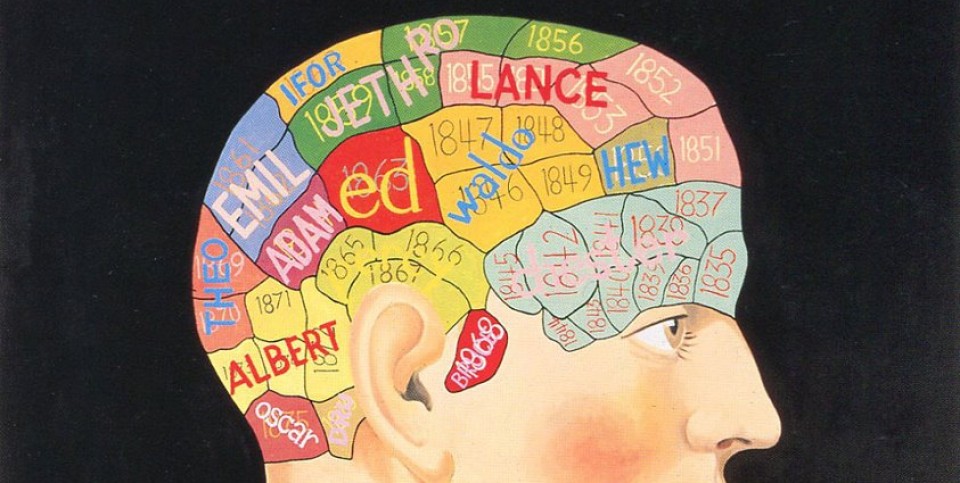


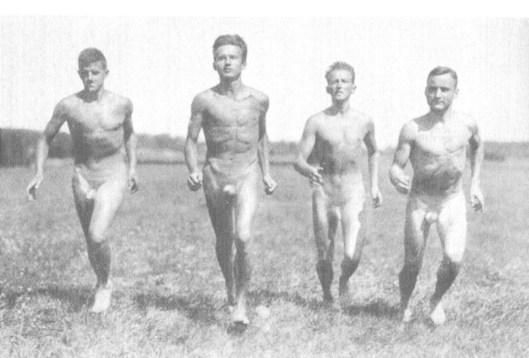
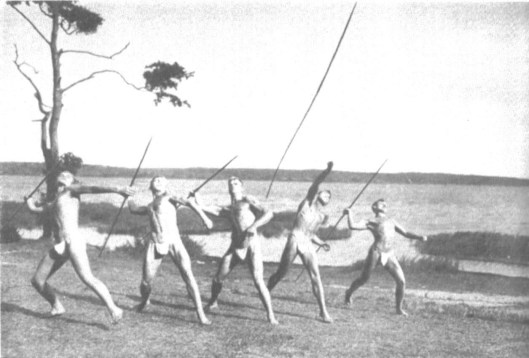
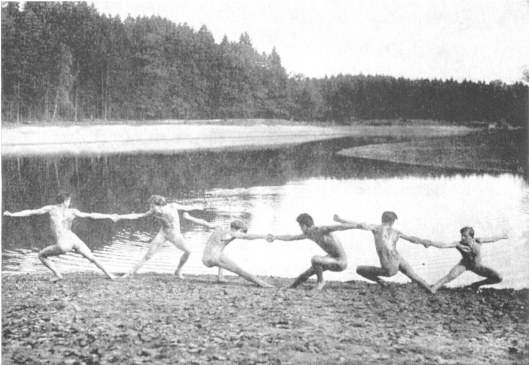

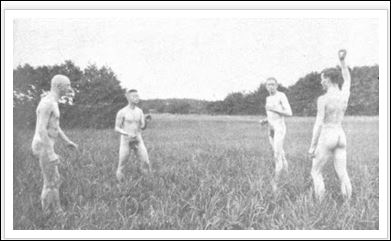
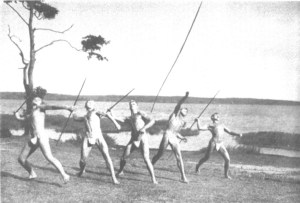

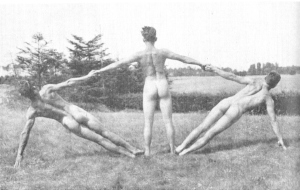
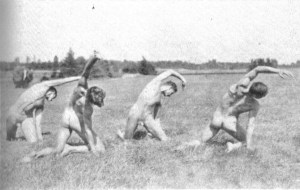
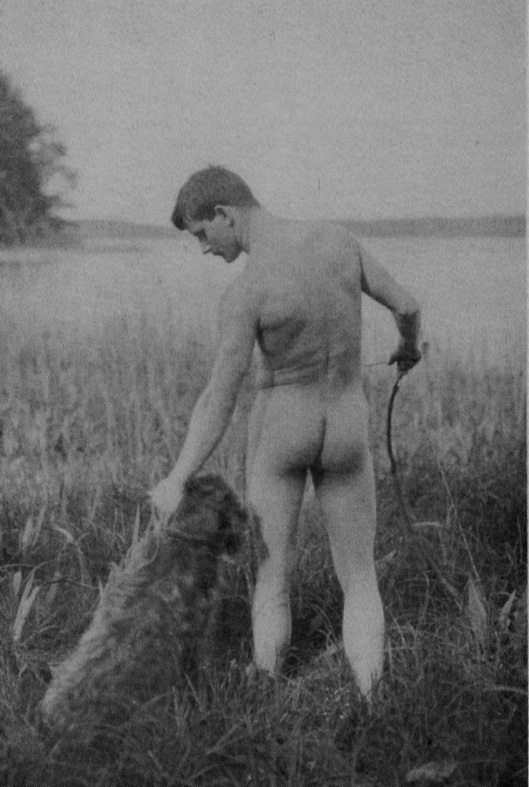
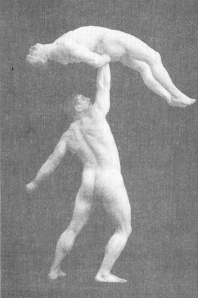


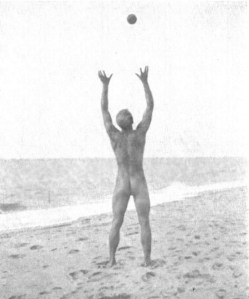





Here’s the original article:
http://aryanfuturism.blogspot.ca/2006/04/hans-bluher-and-wandervogel.html
LikeLiked by 1 person
Yes. I translated it into English. I put it on my site to disassociate it from a somewhat racist blog. Some of the Followers were racist, but as a movement it encompassed both right and left ideologies.
LikeLike
I was wondering what aspect of the masculine movement the above photos were taken from? Are they images from Der Eigene or from the Wandervogel?
LikeLike
I believe they are a combination of both.
LikeLike
You post very interesting articles here. Your website deserves much bigger audience.
It can go viral if you give it initial boost, i know very useful service that can help you, just search
in google: svetsern traffic tips
LikeLiked by 2 people
Pingback: The Masculine Movement in Germany | The Gay Historian